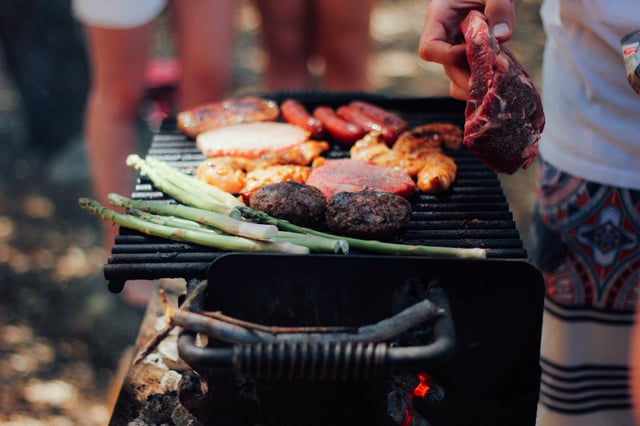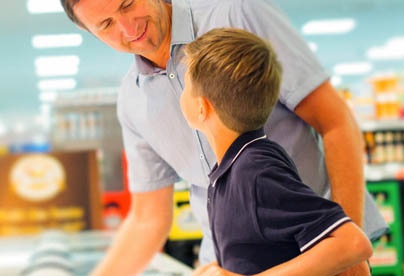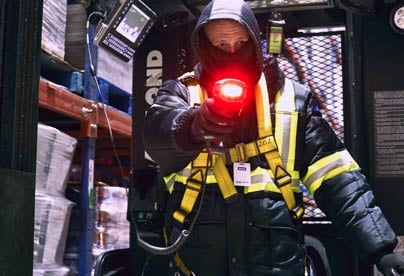
Barbequing is something many Canadians love to partake in, and this is particularly the case when the sun is out and the warm weather calls our name. Predictably, cooking outdoors in warm weather can present food safety challenges when it comes to handling and preparing items that have been away from the fridge for a prolonged period. As with any cooking, it’s important to follow simple food handling guidelines at your next cookout to prevent food poisoning and other food-borne illnesses.
Quick Tips
Tip #1:
The colour of meat is not a reliable indicator that meat is safe for eating. It’s possible for meat to change to a colour associated with doneness before all harmful bacteria has been removed, which makes using a digital thermometer key to any BBQ experience.
Tip #2:
Always marinate meat in the refrigerator in a sealed container and be sure to store it in a spot that will not contaminate other products in your fridge. Never marinate on the counter.
Shopping for your meal
As with any good home-cooked meal, your BBQ experience starts at the grocery store. There is no better time to get all the ingredients needed for the perfect cookout and to prepare yourself for a great meal. However, before you race through your shopping, it’s important to be mindful of a few things.
While shopping for groceries, make sure you leave the cold food such as meat for the end of your shopping trip. Perishable foods should always be refrigerated within one to two hours, so it's important to provide yourself with the necessary lead time to get home. If you think the transport time is going to take longer, it is worth bringing along an insulated cooler to hold your perishables, or buying one while at the grocery store. This precaution is especially important during the warm summer months when your car may not be a cool enough environment for prolonged food storage.
Also, it’s important to keep meat separate from other grocery items when shopping. Aim to place your meat products in different plastic bags to stop any juices from cross-contaminating with your other items.
The do’s and don’ts of raw meat storage
After a successful shopping trip, it’s important to store any raw meat you purchased in the refrigerator as soon as possible. Any raw poultry or ground beef not used within two days should be kept in the freezer. Store any other meats in the fridge up to five days; otherwise, it should be frozen as well.
If you are choosing to marinate the meat, always do so in the fridge and not on the counter. Any extra marinade left for basting or dipping should be set aside and not have contact with uncooked meat.
Defrosting frozen raw meat
Thawing raw meat always requires a little planning given the time it takes to do it properly.
There are a few things to keep in mind when thawing out meat:
- Meat should never be thawed out on the counter and always in the refrigerator if possible
- You can thaw meat in cold water, but make sure the package is sealed properly before doing so.
- Microwave defrosting is an acceptable alternative, but only if the item is placed directly on the grill shortly after.
The art of grilling and using a digital thermometer
As we know, most bacteria that cause food-borne illness can be eliminated by heat, which is why it’s so important to cook meat properly to a safe internal temperature. However, it is important to note that colour alone is not a reliable indicator that meat is cooked properly.
When checking the temperature, make sure to take it off the BBQ and place it on a clean plate. Once on the plate, insert the digital thermometer into the thickest part of the meat to take an accurate reading. Make sure to check each piece of meat individually since heat on a grill can often be distributed unevenly.
Serving food properly
When serving food it important to keep meat as hot as possible until it’s ready to be served. Once ready to serve, remember to use a clean plate and not the one that held raw meat. A clean plate prevents recontamination of the meat from natural juices that were left behind.
When the meal is all but over…
It’s time to put another one in the books. You prepared, cooked and served a delicious meal. However, before you pat yourself on the back, you probably still have some leftovers to deal with. Easy enough. Just make sure you try to refrigerate the remaining food in shallow containers and discard anything that has been left out for more than 2 hours (on hot summer days, no longer than 1).
Remember, as the saying goes, when in doubt – throw it out!
Safety is the responsibility of everyone and through careful planning and personal responsibility, we can all build a safer workplace for everyone to operate within. Contact one of our Sales Specialists today and let us show you why we are the right choice for your business. sales@versacold.com or 1-800-563-COLD










